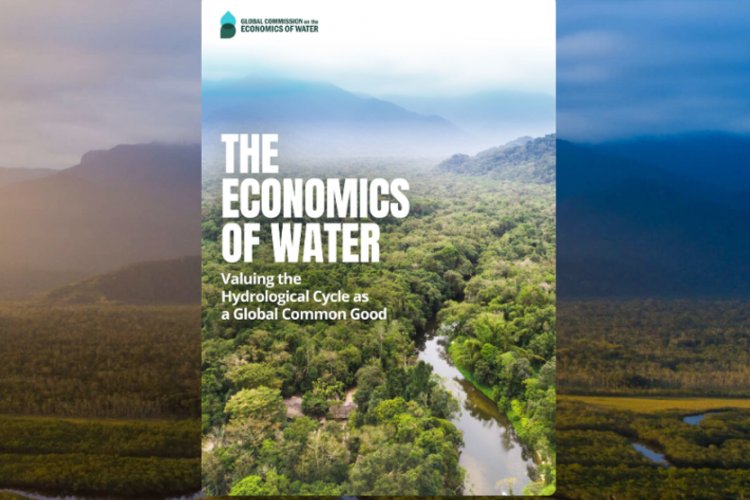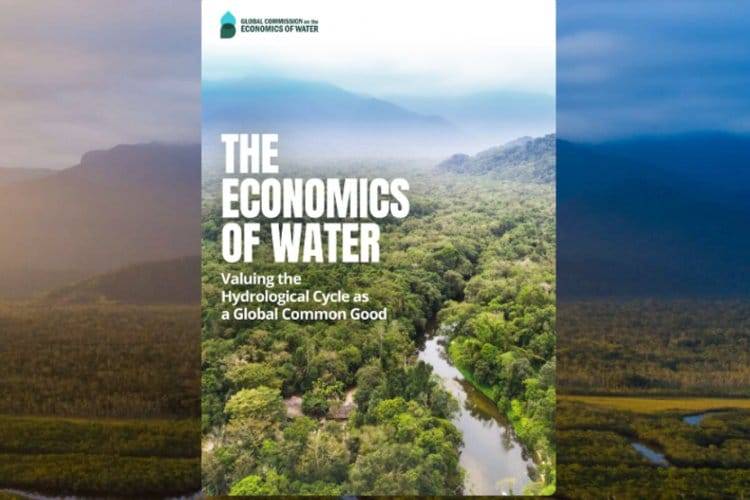Main Points In Hindi (मुख्य बातें – हिंदी में)
यहां रिपोर्ट "जल का अर्थशास्त्र: वैश्विक सामान्य भलाई के रूप में जल विज्ञान चक्र को महत्व देना" के मुख्य बिंदुओं का सारांश दिया गया है:
-
जल संकट का खतरा: रिपोर्ट में कहा गया है कि जल संकट 2050 तक दुनिया के आधे से अधिक खाद्य उत्पादन को खतरे में डाल देगा, जिससे अर्थव्यवस्थाओं पर गंभीर प्रभाव पड़ेगा, विशेषकर कम आय वाले देशों में।
-
अर्थव्यवस्थाओं पर प्रभाव: जल संकट के कारण, देशों को औसत 8% तक का सकल घरेलू उत्पाद (GDP) हानि हो सकती है, और कुछ क्षेत्रों में यह आंकड़ा 15% तक पहुंच सकता है।
-
जलवायु और जल चक्र का असंतुलन: कमजोर अर्थव्यवस्था और जल संसाधनों के कुप्रबंधन ने जलवायु संकट को बढ़ाया है, जिससे लगभग तीन अरब लोगों के क्षेत्रों में जल की कमी और खाद्य सुरक्षा का संकट उत्पन्न हो गया है।
-
परिवर्तन की आवश्यकता: रिपोर्ट में जल संकट से निपटने के लिए कृषि प्रणालियों में बदलाव, पारिस्थितिकी तंत्र का संरक्षण और जल अर्थव्यवस्था के चक्रीय मॉडल को अपनाने की सलाह दी गई है।
- वैश्विक सहयोग का आह्वान: विभिन्न देशों और संगठनों के बीच सहयोग की आवश्यकता पर बल दिया गया है ताकि जल संकट का समाधान बहुपरकारी दृष्टिकोण से किया जा सके, जिसमें सार्वजनिक और निजी क्षेत्रों की भागीदारी शामिल है।
Main Points In English(मुख्य बातें – अंग्रेज़ी में)
Here are 4 main points derived from the report titled "The Economics of Water: Valuing the Hydrological Cycle as a Global Common Good":


-
Impact of Water Crisis on Food Production: The report warns that by 2050, the global water crisis could threaten more than half of the world’s food production, leading to significant economic losses. Low-income countries could see a GDP loss of up to 15%.
-
Consequences of Poor Water Management: The combination of weak economies, poor land use practices, and mismanagement of water resources has placed unprecedented stress on the global hydrological cycle, exacerbating the climate crisis. Nearly 3 billion people are affected by declining water availability.
-
Urgency for Action: Johan Rockström, co-chair of the commission, emphasizes the severity of the crisis, stating that half of the world’s population already faces water shortages. Without immediate action, food security and human development will be at risk.
- Need for a Paradigm Shift: The report advocates for a new approach to water management that acknowledges its multiple values in economies and ecosystems. It proposes five missions, including transforming agricultural systems and promoting a circular water economy, to mitigate the impending crisis. Collaboration and innovative solutions are essential for sustainable water management.
Complete News In Hindi(पूरी खबर – हिंदी में)
एक ऐतिहासिक रिपोर्ट, द इकोनॉमिक्स ऑफ वॉटर: वैल्यूइंग द हाइड्रोलॉजिकल साइकल एज़ ए ग्लोबल कॉमन गुड, में ग्लोबल कमीशन ऑन द इकोनॉमिक्स ऑफ वॉटर का कहना है कि जल संकट 2050 तक दुनिया के आधे से अधिक खाद्य उत्पादन को खतरे में डाल देगा।
नेताओं और विशेषज्ञों के एक अंतरराष्ट्रीय समूह ने चेतावनी दी है कि जब तक मानवता अधिक साहस और तत्परता के साथ कार्य नहीं करती, तेजी से असंतुलित होता जल चक्र दुनिया भर की अर्थव्यवस्थाओं और मानवता पर कहर बरपाएगा।
एक ऐतिहासिक रिपोर्ट में, जल का अर्थशास्त्र: वैश्विक सामान्य भलाई के रूप में जल विज्ञान चक्र को महत्व देनाद जल के अर्थशास्त्र पर वैश्विक आयोग का कहना है कि जल संकट के कारण 2050 तक विश्व का आधे से अधिक खाद्य उत्पादन खतरे में पड़ जाएगा।
इससे 2050 तक दुनिया भर के देशों में औसतन 8 प्रतिशत सकल घरेलू उत्पाद के नुकसान का खतरा है, कम आय वाले देशों में 15% तक का नुकसान होगा, और इससे भी बड़े आर्थिक परिणाम होंगे।
आयोग का कहना है कि कमजोर अर्थव्यवस्था, विनाशकारी भूमि उपयोग और जल संसाधनों के लगातार कुप्रबंधन ने बिगड़ते जलवायु संकट के साथ मिलकर वैश्विक जल चक्र को अभूतपूर्व तनाव में डाल दिया है।
लगभग तीन अरब लोग और दुनिया के आधे से अधिक खाद्य उत्पादन उन क्षेत्रों में हैं जहां पानी सूखने, या कुल जल उपलब्धता में अस्थिर रुझान का सामना करना पड़ रहा है। इसके अलावा, जमीन के नीचे पानी की कमी के कारण कई शहर डूब रहे हैं।
जोहान रॉकस्ट्रॉमआयोग के सह-अध्यक्ष और पॉट्सडैम इंस्टीट्यूट फॉर क्लाइमेट इम्पैक्ट रिसर्च (पीआईके) के निदेशक ने स्थिति की गंभीरता पर जोर देते हुए कहा, “आज, दुनिया की आधी आबादी पानी की कमी का सामना कर रही है। जैसे-जैसे यह महत्वपूर्ण संसाधन लगातार दुर्लभ होता जा रहा है, खाद्य सुरक्षा और मानव विकास खतरे में है – और हम ऐसा होने दे रहे हैं,” देखा गया
“मानव इतिहास में पहली बार, हम वैश्विक जल चक्र को असंतुलित कर रहे हैं। जोहान रॉकस्ट्रॉम ने कहा, “मानव-जनित जलवायु और भूमि उपयोग परिवर्तन के कारण, सभी मीठे पानी का स्रोत, वर्षा पर अब भरोसा नहीं किया जा सकता है, जो मानव कल्याण और वैश्विक अर्थव्यवस्था के आधार को कमजोर कर रहा है।”
रिपोर्ट में तर्क दिया गया है कि मौजूदा दृष्टिकोण के कारण जल संकट पैदा हुआ है। वे संपूर्ण अर्थव्यवस्थाओं में और प्रकृति के महत्वपूर्ण पारिस्थितिकी तंत्र के संरक्षण में पानी के कई मूल्यों को नजरअंदाज करते हैं।
न्गोजी ओकोन्जो-इवेला, विश्व व्यापार संगठन के महानिदेशक और आयोग के सह-अध्यक्ष ने कहा, “वैश्विक जल संकट एक त्रासदी है, लेकिन यह पानी के अर्थशास्त्र को बदलने का एक अवसर भी है – और इसकी कमी और इसके कई लाभों को पहचानने के लिए पानी का उचित मूल्यांकन करके शुरुआत करें।” पहुंचाता है।”
रिपोर्ट आसन्न संकट को रोकने के लिए पांच मिशन प्रस्तुत करती है, जिसमें कृषि प्रणालियों को बदलना, प्राकृतिक आवासों का संरक्षण करना और एक चक्रीय जल अर्थव्यवस्था को बढ़ावा देना शामिल है। यह पानी की तीव्रता को कम करने के लिए नवीकरणीय ऊर्जा और कृत्रिम बुद्धिमत्ता में नवीन समाधानों का भी आह्वान करता है।
थर्मन शनमुगरत्नम, सिंगापुर के राष्ट्रपति और आयोग के सह-अध्यक्ष ने एक सहयोगात्मक वैश्विक प्रयास की आवश्यकता पर बल देते हुए कहा, “हम केवल बहुपक्षीय रूप से सोचकर, सार्वजनिक और निजी वित्त दोनों जुटाकर और जलवायु और जैव विविधता चुनौतियों के साथ जल प्रशासन को संबोधित करके ही इस संकट को हल कर सकते हैं।”
संयुक्त राष्ट्र 2023 जल सम्मेलन के सह-मेजबान के रूप में नीदरलैंड सरकार की पहल पर मई 2022 में पानी के अर्थशास्त्र पर वैश्विक आयोग (जीसीईडब्ल्यू) का गठन किया गया था, जिसका उद्देश्य यह परिभाषित करना है कि दुनिया पानी को कैसे महत्व देती है और उसका प्रबंधन कैसे करती है, सरकारों से आग्रह किया गया है कि भावी पीढ़ियों के लिए इस महत्वपूर्ण संसाधन की सुरक्षा के लिए एक मिशन-संचालित दृष्टिकोण अपनाएं।
Complete News In English(पूरी खबर – अंग्रेज़ी में)



A groundbreaking report, “The Economics of Water: Valuing the Hydrological Cycle as a Global Common Good,” by the Global Commission on the Economics of Water, warns that the water crisis could jeopardize more than half of the world’s food production by 2050.
An international group of leaders and experts has issued a warning that unless humanity acts with greater courage and determination, the increasingly unbalanced water cycle will wreak havoc on economies and society around the world.
The historical report, The Economics of Water: Valuing the Hydrological Cycle as a Global Common Good from the Global Commission on the Economics of Water, states that the water crisis could threaten over half of the world’s food production by 2050.
This could lead to an average loss of 8% of gross domestic product (GDP) across countries by 2050, with low-income countries facing losses of up to 15%, resulting in severe economic consequences.
The commission highlights that weak economies, destructive land use, and the mismanagement of water resources, combined with the worsening climate crisis, have put unprecedented stress on the global water cycle.
Nearly three billion people and over half of the world’s food production are in areas facing water shortages or unstable water availability. Additionally, many cities are sinking due to groundwater depletion.
Johann Rockström, co-chair of the commission and director of the Potsdam Institute for Climate Impact Research (PIK), emphasized the severity of the situation, stating, “Today, half the world’s population is facing water scarcity. As this vital resource becomes increasingly scarce, food security and human development are at risk – and we are allowing this to happen.”
“For the first time in human history, we are destabilizing the global water cycle. Johann Rockström said, “Due to human-induced climate and land-use changes, we can no longer rely on rainwater, which undermines the foundation of human welfare and the global economy.”
The report argues that the current approach has led to the water crisis. It overlooks the many values of water in national economies and the preservation of critical natural ecosystems.
Ngozi Okonjo-Iweala, Director-General of the World Trade Organization and co-chair of the commission, stated, “The global water crisis is a tragedy, but it is also an opportunity to change the economics of water – starting with recognizing its scarcity and valuing the many benefits it provides.”
The report outlines five missions to avert the impending crisis, including transforming agricultural systems, protecting natural habitats, and promoting a circular water economy. It also calls for innovative solutions in renewable energy and artificial intelligence to reduce water intensity.
Tharman Shanmugaratnam, President of Singapore and co-chair of the commission, stressed the need for a collaborative global effort, saying, “We can only address this crisis by thinking multilaterally and mobilizing both public and private finance to tackle water management alongside climate and biodiversity challenges.”
The Global Commission on the Economics of Water (GCEW) was established in May 2022, as an initiative of the Dutch government, co-hosting the UN 2023 Water Conference. Its goal is to define how the world values and manages water and to encourage governments to adopt a mission-driven approach to safeguard this critical resource for future generations.








